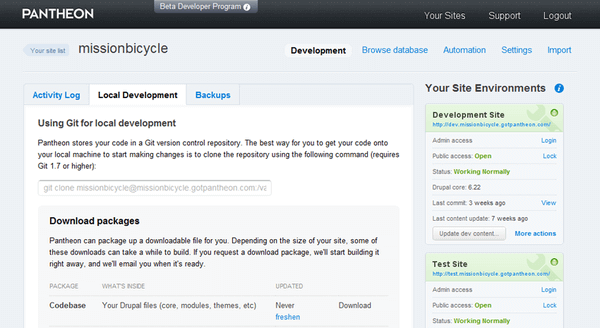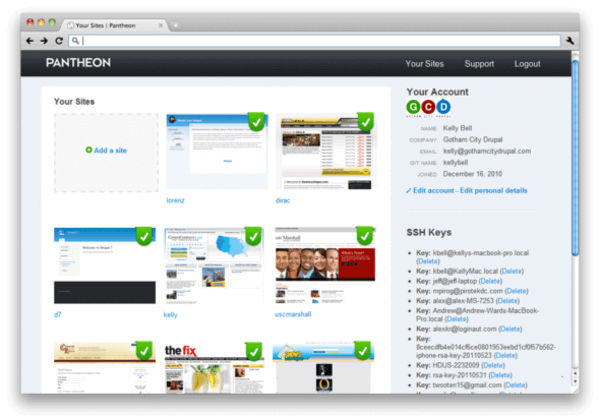Pantheon is launching a Drupal-based service for creating, managing, and scaling enterprise-class Web sites.

Hosted Drupal sites are not new. You can get a Drupal site on just about any shared hosting service, or just install it yourself in less than 20 minutes. But what Pantheon is offering is more than just a Drupal site on a server; they’re promising turnkey scalability, backups, revision control and more.
How’s This Different?
The key question for Pantheon is how the company differentiates its service against, say, Drupal Gardens. Like Drupal Gardens, Pantheon’s service lets customers worry about developing their sites and not about how to scale them.
Where Pantheon goes a bit deeper is in its developer tools. According to Rosen, Pantheon gives developers the ability to work on a development site and then push changes into production. They have version control (with Git) at their fingertips, and a streamlined setup for downloading work to their desktop.

Developers have a choice between Drupal 6, Drupal 7 and “installation profiles” like Open Atrium. If you have a Drupal-based site already, you can import it into Pantheon automatically.
Pantheon also offers support for multiple sites, which CEO and co-founder of Pantheon Zack Rosen says is a big part of the problem for larger institutions. Rosen says that offerings like Drupal Gardens or WordPress.com are fine for a blog or business with “four or five” pages, but not so much for companies that have complex Web sites.
Rosen does know a bit about complex sites. He was involved with the Howard Dean campaign and DeanSpace, which used Drupal. The Pantheon team also has Pressflow creator David Strauss onboard.

Naturally, Pantheon also offers support with the help-desk built directly in to the same console admins use to manage their sites.
Rackspace Over Amazon
Rosen said that the company opted to go with RackSpace Cloud for its hosting. Why not Amazon? According to a post on their blog, Rackspace has better CPU and I/O performance than Amazon EC2.
Not that Rackspace is better in every area. Pantheon notes that Rackspace’s services ecosystem is not as mature, and it has smaller disk quotas. But it also wins out in having features AWS doesn’t offer, like a hybrid offering for customers to use hardware solutions with cloud solutions.
Plans for Pantheon start at $100 a month. However, Rosen notes that companies only pay for sites that are in production mode, so it’s free to start development on Pantheon until you push a site live.
Overall, the Pantheon service sounds pretty basic, but there’s a lot going on behind the scenes. For companies that are set on the Drupal platform, it might be worth a look rather than dealing with managing the site hosting.

















